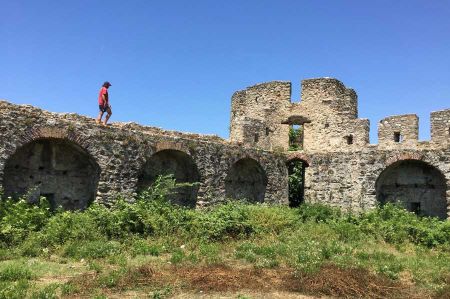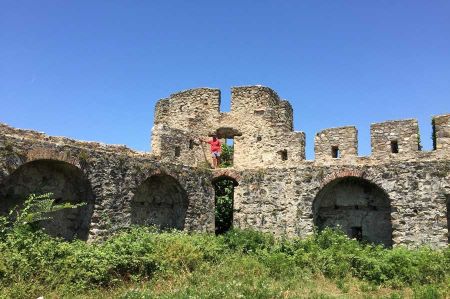Poti - once a Greek colony in today's Georgia
- Written by Portal Editor
Although Micha and Philipp are already back from their year-long tour of the Balkans in Turkey and on to Georgia, some reports on their destinations are still pending. So we have reported on their negative experiences when they wanted to go to Russia from Georgia, which they were not allowed despite the presented visa.
This was one of the reasons to extend their stay in Georgia, also taking the time to gain further insights into the country and its people.
Last but not least, the cold and the snow in the mountains had caused the two to go back to the Black Sea coast, so the port city of Poti was their next destination. In the immediate vicinity of the modern city of Poti a Greek colony, founded by merchants and repatriates, was located since the early 6th century BC, called the ancient city of Phasis. According to the legend of the Greek Argonauts, the mouth of the eponymous river Phasis, today's Rioni, was the main destination of Jason and the Argonauts in search of the Golden Fleece in the Colchis.
Rioni - mighty estuary delta at Poti
 Still a mighty river with estuarine delta on one side of the town of Poti is the lake Paliastomi / Paleostomi on the southern city limits today, which is still recognizable as part of the once huge estuary of the Rioni with its huge wetlands, especially because of the two rivers Kaparcho and Fechory which fed the lake with fresh water. The only 18 km2 large lake has a depth of two to three meters, but interesting is that its water is almost never frozen, even in the dead of winter, due to its location in the wet subtropical zone of the country. The mixing with the sea water of the Black Sea has its share in this.
Still a mighty river with estuarine delta on one side of the town of Poti is the lake Paliastomi / Paleostomi on the southern city limits today, which is still recognizable as part of the once huge estuary of the Rioni with its huge wetlands, especially because of the two rivers Kaparcho and Fechory which fed the lake with fresh water. The only 18 km2 large lake has a depth of two to three meters, but interesting is that its water is almost never frozen, even in the dead of winter, due to its location in the wet subtropical zone of the country. The mixing with the sea water of the Black Sea has its share in this.
In 1961, archaeologists in search of the ancient city of Phasis on the bottom of Lake Paliastomi found traces of human settlements dating back to the second century AD. In the further search there was a special expedition in 1985. During these investigations at the bottom of the lake possible foundations and paving stones about 1 meter wide and 20 meters long were found. In the northwestern part of the lake fragments were found that could not be clearly assigned to this day. As a result of the archaeological research on the floor of the Paliastomi, a large number of ceramics from different periods was presented.
Archaeologists found remains of the ancient Phasis
 Archaeological research has revealed that the location of the ancient city is largely known, especially as it has found part of the settlement below the surface of Lake Paliostomi. In Phasis even an Apollo temple was to be seen once, which is known among other things by an inscription on a silver bowl from Subow (Kuban). Celebrity also had the Colchic Academy in Phasis. The place of education, which was traceable until the 6th century, taught in Georgian and Greek, while Byzantine historians praised their flourishing arithmetic and rhetoric.
Archaeological research has revealed that the location of the ancient city is largely known, especially as it has found part of the settlement below the surface of Lake Paliostomi. In Phasis even an Apollo temple was to be seen once, which is known among other things by an inscription on a silver bowl from Subow (Kuban). Celebrity also had the Colchic Academy in Phasis. The place of education, which was traceable until the 6th century, taught in Georgian and Greek, while Byzantine historians praised their flourishing arithmetic and rhetoric.
The town was located at the river mouth until the Byzantine period, but the settlement was limited by the location in the vicinity of extensive marshes, there was also a latent threat of malaria. The port city formed a station of the Silk Road crossing the Black Sea. In the 5th century, Phasis was a hub for goods from India, Central Asia, the Middle East and the Mediterranean, and coin finds bear witness to the lively trade.
As a result of the conquests of the Sassanid Empire, Abkhazia became an isolated part of the Byzantine Empire. With the advance of the Arabs the area was at times part of the Abbasid caliphate. After the invasion of the Mongols the breakup in small principalities followed, which were tributary to the Turks since the 13th century. To protect the hinterland of Poti, the Turks built a fortress.
Czarist Russia took Poti in 1828. Today's city developed in the 1880s, after 1872 Georgia's first railway line between Poti and Tbilisi was completed and a seaport had been created. At the beginning of the 20th century, Poti as an export port for manganese ore boomed enormously. At that time, Georgia was the world's second largest supplier of manganese ore needed for steelmaking in heavy industry.
Poti - an important port city in Georgia's foreign trade
Poti is next to Batumi one of the two major seaports of Georgia and therefore of great importance for Georgian foreign trade. About Poti manganese, corn, lumber and wine are exported to this day. Georgia's southern neighbor Armenia as a landlocked country does not have its own access to the sea. A large part of the trade to and from Armenia, therefore, makes use of the port of Poti and the Georgian Railway.
Today, Lake Paliostomi is a popular destination for the citizens of Poti, but other guests can also find themselves on the shore, especially since there are about 90 species of fish in the lake, making the lake a very popular fishing paradise. In addition to the fishermen, the lake is an interesting place for ornithologists to observe the life of many waterfowl. Today this really impressive lake belongs to the nature reserve of Colchis.
Please read as well:
Farma Sotira - practical kitchenbox 1.0 in use in Albania
Laroma Travel - sleeping systems for customers
